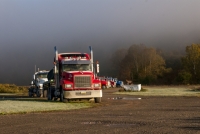Co-Written with Caroline Selle
An August 6 court decision handed down by Calvert County Circuit Court Judge James Salmon could put Dominion Resources’ timeline for its proposed Cove Point liquefied natural gas (LNG) export facility in jeopardy.
Salmon ruled that an ordinance exempting the Lusby, Md.-based LNG project from local zoning laws — Ordinance 46-13 — violated both a section of a state Land Use law, as well as Maryland's constitution. The facility will be fueled by gas obtained via hydraulic fracturing (“fracking”).
In the ruling, Judge Salmon described the zoning exemption as “a very unusual situation.” In 2013, the Calvert County Board of County Commissioners and the Calvert County Planning Commission carved out both LNG export and import facilities from zoning laws.
“To my knowledge no other municipality or county in Maryland has attempted to do what the Calvert County Board of County Commissioners has attempted to do, i.e. completely exempt two uses from being covered by zoning regulations while requiring everyone else in the County to abide by those regulations,” wrote Salmon.
Environmental groups fighting against the Cove Point LNG export terminal hailed Salmon's judgment as a major grassroots victory.
“At a minimum, this ruling will likely cause real delay in the ability of Dominion to begin major construction of this controversial $3.8 billion fossil fuel project,” Mike Tidwell, executive director of Chesapeake Climate Action Network (CCAN), said in a press release. “The ruling should certainly give pause to the Wall Street investors that Dominion is seeking to recruit to finance this expensive, risky project.”
The plaintiffs in the lawsuit, AMP Creeks Council (shorthand for Accokeek Mattawoman Piscataway Creeks Council), came to a similar conclusion.
“This is a remarkable victory for the people of Lusby, Maryland, and folks fighting fracking and LNG exports throughout the Mid-Atlantic region,” Kelly Canavan, President of AMP Creeks Council, said in a press release.
Yet, Salmon concluded the ruling out by stating his decision “has no direct bearing on whether the facility will be built or not.” And even AMP Creeks acknowledged in its press release that its legal team “is still sorting out the implications of this ruling.”
Further, Canavan told DeSmogBlog in an interview that she agrees with Salmon, at least in terms of the legal argument he put forward about his role in the final destiny of the Cove Point LNG export facility.
“Even if he wanted to, he does not have the power to determine whether or not the facility will be built,” she said. “It doesn’t mean there won’t be a ripple effect.”
So, what gives? Is the decision a game-changer or something less? Dominion certainly thinks the latter, based on a review of its quarter two earnings call transcript.



























